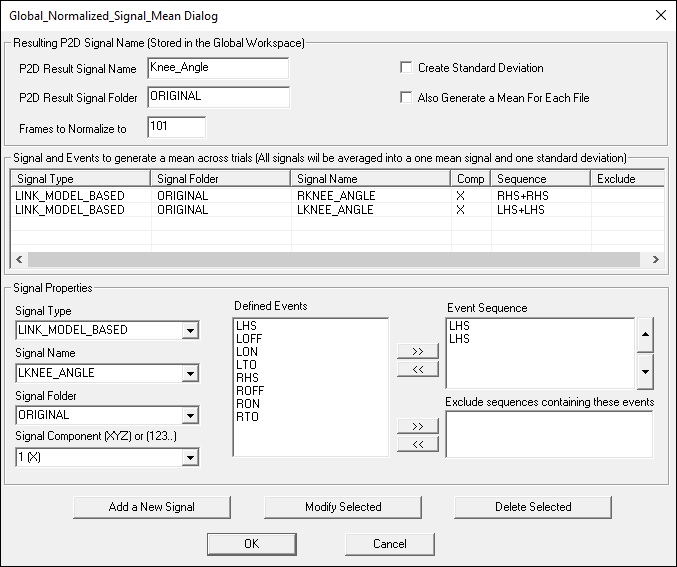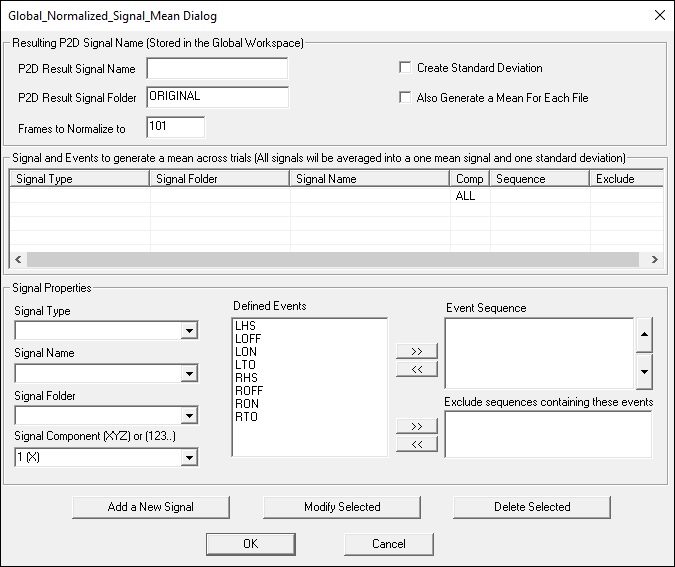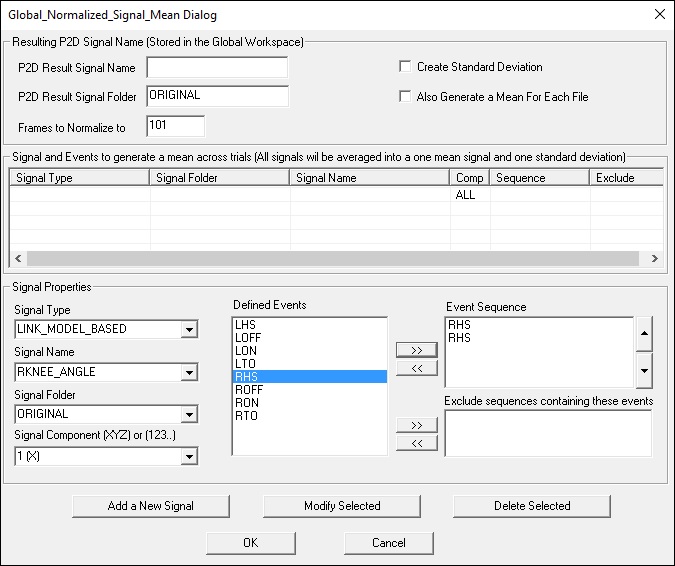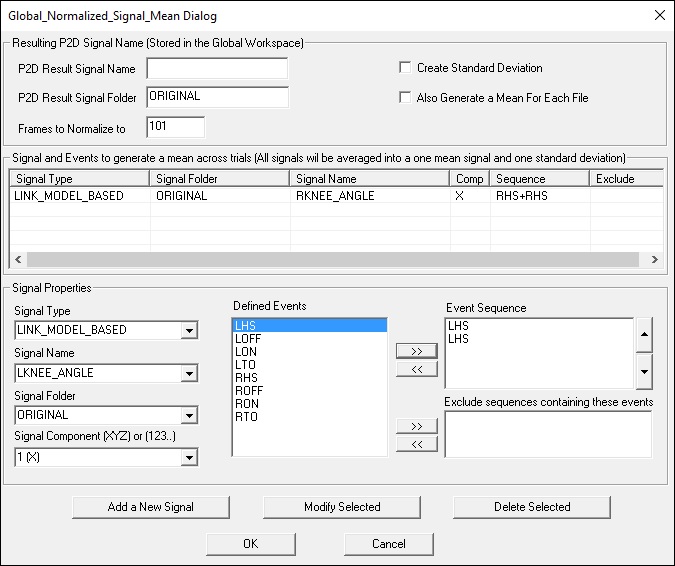Table of Contents
Signal Management Commands
Contents
Signal Management
Global_Normalized_Signal_Mean
Time normalize a signal (in this case Knee Flexion Angle) between events (RHS to RHS) for Right Knee angles and (LHS to LHS) for Left Knee angles, and compute a GLOBAL mean and Standard Deviation. Note: the Global_Normalized_Signal_Mean command only works on one component at at time for each signal. (You must select either Y, Y or Z as the SIGNAL_COMPONENTS.)
First add the Global_Normalized_Signal_Mean command to the pipeline. Double click on the command to launch the dialog.
select the RKNEE_ANGLE Signal and the event sequence (e.g RHS to RHS) and select Add A New Signal
select the LKNEE_ANGLE Signal and the event sequence (e.g LHS to LHS) and select Add A New Signal
Enter the P2D Result Signal Name and click Create Standard Deviation Button 
When you select OK the text representation of the command should be as follows:
Global_Normalized_Signal_Mean /SIGNAL_TYPES=LINK_MODEL_BASED+LINK_MODEL_BASED /SIGNAL_NAMES=RKNEE_ANGLE+LKNEE_ANGLE /SIGNAL_FOLDER=ORIGINAL+ORIGINAL /SIGNAL_COMPONENTS=X+X /START_LABEL= /END_LABEL= /EVENT_SEQUENCE= RHS+RHS++LHS+LHS ! /EXCLUDE_EVENTS= /RESULT_NAME=KNEE_FLEXION ! /RESULT_FOLDER=ORIGINAL /NORMALIZE_POINTS=101 /CREATE_STANDARD_DEVIATION=TRUE ! /CALCULATE_PER_FILE=FALSE ;
Note: If CALCULATE_PER_FILE=FALSE Signals from all active files are used to compute the mean.
Note: If CALCULATE_PER_FILE=TRUE The mean value is computed for Signals from each active files. The global mean value is then the mean value of the mean values.
Note: The Output signal is a P2D Signal, which is associated with every file. The resulting signal, therefore, is stored in the GLOBAL_WORKPACE
Meta-Command - Create_Global_Means_For_Left_Right
A Meta-Command can be created for processing all 3 components of a number of model based signals using one pipeline command.
Let the original cmo file contain the following signals: RANKLE_ANGLE, RKNEE_ANGLE, RHIP_ANGLE, LANKLE_ANGLE, LKNEE_ANGLE, and LHIP_ANGLE.
Let the events for heel strike be labeled LHS and RHS. The mean signal should be computed from heel strike to heel strike.
The Pipeline call for the Meta-Command below is:
Create_Global_Means_For_Left_Right /TYPE=ANGLE /JOINTS=ANKLE+KNEE+HIP /START_EVENT=HS /END_EVENT=HS ;
The Meta-Command, which should be placed in the Meta_Command folder within the Plugins folder is as follows:
! BEGIN_META ! META_CMD_NAME=Create_Global_Means_For_Left_Right ! META_PARAM= TYPE : string ::yes ! META_PARAM= JOINTS : string ::yes ! META_PARAM= START_EVENT : string ::yes ! META_PARAM= END_EVENT : string ::yes ! END_META ! Create a Global_Normalized_Signal_Mean event for left and right sides with common labels (e.g.RHS and LHS) For_Each /ITERATION_PARAMETER_NAME=INDEX1 /ITEMS=::JOINTS ; For_Each /ITERATION_PARAMETER_NAME=INDEX2 /ITEMS=X+Y+Z ; Global_Normalized_Signal_Mean /SIGNAL_TYPES=LINK_MODEL_BASED+LINK_MODEL_BASED /SIGNAL_NAMES=R&::INDEX1&_&::TYPE+L&::INDEX1&_&::TYPE /SIGNAL_FOLDER=ORIGINAL+ORIGINAL /SIGNAL_COMPONENTS=::INDEX2+::INDEX2 /START_LABEL=R&::START_EVENT+L&::END_EVENT /END_LABEL=R&::START_EVENT+L&::END_EVENT ! /EVENT_SEQUENCE= ! /EXCLUDE_EVENTS= /RESULT_NAME=::INDEX1&_&::TYPE&_&::INDEX2 ! /RESULT_FOLDER=ORIGINAL ! /NORMALIZE_POINTS=101 ! /CREATE_STANDARD_DEVIATION=FALSE ! /CALCULATE_PER_FILE=FALSE ; End_For_Each /ITERATION_PARAMETER_NAME=INDEX2 ; End_For_Each /ITERATION_PARAMETER_NAME=INDEX1 ;
Find Representative Signal
Find the signal that is most representative of a set of signals. This implementation is based on the following article:
Shadmehr R and Mussa-Ivaldi FA (1994) Adaptive Representation of Dynamics during Learning of a Motor Task. J. Neuroscience 14(5), pp 3208-3224.
Note: that there is an error in the appendix that we have accounted for.
For example, to find the representative Knee Flexion Angle over the range RHS to RHS.
Find_Representative_Signal /SIGNAL_TYPES=LINK_MODEL_BASED /SIGNAL_NAMES=RKNEE_ANGLE /SIGNAL_FOLDER=ORIGINAL /SIGNAL_COMPONENTS=X /EVENT_SEQUENCE=RHS+RHS ! /EXCLUDE_EVENTS= ! /NORMALIZE_RESULT_POINTS= /RESULT_NAME=RKNEE_ANGLE_REP ! /RESULT_FOLDER=ORIGINAL ;
Merge_Data
Merges data from more than one data name into a single signal either by APPEND_TO_END (appending one signal to the end of another signal) or by MERGE_AS_NEW_COMPONENTS (treat each original signal as a component of the new signal)
For example, create a vector from 3 analog signals.
Merge_Data /SIGNAL_NAMES=Analog1+Analog2+Analog3 /SIGNAL_TYPES=ANALOG+ANALOG+ANALOG /SIGNAL_FOLDER=ORIGINAL+ORIGINAL+ORIGINAL /SIGNAL_COMPONENTS=0+0+0 /RESULT_NAME=Vector /RESULT_TYPE=DERIVED /RESULT_FOLDER=PROCESSED /MERGE_TYPE=MERGE_AS_NEW_COMPONENTS ;
Note: If the Signal_Components parameter is empty, all components of the signals will be used.
Copy_Folder
Makes a copy of an existing folder. If the new folder already exists, select whether these signals should be overwritten (replaced).
Copy_Folder /SIGNAL_TYPE= /EXISTING_FOLDER= /NEW_FOLDER_NAME= /OVERWRITE_EXISTING_SIGNALS=FALSE ;
Rename_Folder
Rename the specified data tree folder.
Rename_Folder /SIGNAL_TYPE= /EXISTING_FOLDER= /NEW_FOLDER_NAME= ;
Delete_Folder
Deletes the specified folder. Note: that ORIGINAL folders cannot be deleted.
Delete_Folder /SIGNAL_TYPE= /FOLDER= ;
Remove_Signals
Remove a signal from the Workspace. Note: that Visual3D will not allow the user to delete ORIGINAL signals.
Remove_Signals /SIGNAL_TYPES= /SIGNAL_NAMES= ! /SIGNAL_FOLDER=ORIGINAL ;
For example, remove one Derived signal and one Metric
Remove_Signals /SIGNAL_TYPES=DERIVED+METRIC /SIGNAL_NAMES= DERIVED1+METRIC1 ! /SIGNAL_FOLDER=PROCESSED+PROCESSED ;
Rename_Signals
Rename a signal in the Workspace.
For example, rename a DERIVED signal in all of the ACTIVE files
Rename_Signals ! /FILE_NAME= /SIGNAL_TYPES=DERIVED /SIGNAL_NAMES=Derived1 /SIGNAL_FOLDER=PROCESSED /NEW_SIGNAL_NAME=Derived2 ! /APPEND_TO_OLD_SIGNAL_NAME=FALSE ;



